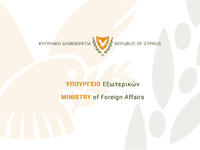Press Releases

03-11-2021 08:07
Statement of Cyprus in the joint general debate in the Fourth Committee of the United Nations General Assembly at its 76th session, on 1st November 2021
Delivered by the Deputy Permanent Representative of Cyprus to the UN, Ms Polly Ioannou
Madam Chair,
My delegation is pleased to see you in the chair and congratulates you on your well-deserved election. My remarks complement the statement of the European Union, to which my delegation fully subscribes, and will cover decolonization, peacekeeping and Special Political Missions.
On peacekeeping, I would like to take this opportunity as a host country, to express our gratitude to the Member States that have contributed military and police personnel to UNFICYP throughout the years and to pay special tribute to those peacekeepers who have sacrificed their lives while serving in Cyprus, from Argentina, Australia, Austria, Bulgaria, Canada, Denmark, Finland, India, Ireland, Kenya, Slovakia, Sweden and the United Kingdom.
The presence of UNFICYP shall continue to be indispensable for my country for as long as part of it remains under foreign occupation. UNFICYP owes its success to its continued ability to fulfill its mandate and create a stable environment in the service of safety and security, as well as an enabling environment for the peace process that aims to settle the conflict. We welcome the upcoming visit of the C-34 to UNFICYP, which we see as an opportunity to make the Force even more effective.
Having evolved into one of the UN’s most important tools, even though it was not reflected in the Charter, peacekeeping is proof that this organization can deliver by finding the means to serve its ends. To maintain this achievement however, the decisions governing the creation, functioning and conclusion of PKOs should continue to be guided by the security situation on the ground and by ensuring that an operation can effectively implement its mandate, in accordance with relevant Security Council resolutions.
To ensure this effectiveness, the following elements should come as standard in the mandate and/or the toolbox of all UN PKOs:
1. They need to be able to prevent and/or respond to violations of the sovereignty and sovereign rights of their host states, in cases of aggression and inter-state conflict.
2. They need to be able to prevent and/or respond to unilateral attempts for military gains on the ground, as well as to violations of the military status quo and the creation of facts on the ground that constitute illegal practices or entrench the conflict. The developments in Varosha since October 2020, with the continuing inability to address and reverse the clear violations of relevant UNSCRs, are a case in point.
3. They need to be able to address arbitrary restrictions imposed by non-cooperative actors on the ground that prevent the operation from implementing its mandate.
4. They should strive for broad and regional situational awareness and share it with the Security Council.
5. They need to have the necessary capabilities for the protection of civilians, including IDPs and other victims of conflict, the facilitation of humanitarian responses, mine action, fact-finding and evidence gathering in the event of atrocities, as well as upholding IHL and international human rights law.
6. They need to be mindful of their environmental footprint, as they increasingly are with the progressive implementation of the UN Environment Strategy for Peace Operations.
7. Last but not least, the importance of a cooperative, synergetic, and accountable relationship between a PKO and its host state cannot be overstated.
Madam Chair,
Turning to Special Political Missions, I wish to start by stressing that they are not simply an instrument to encourage conflict parties to negotiate and resolve their differences peacefully; they reflect the existential purpose of the UN to ensure fair and viable settlements to conflicts and disputes, in line with international law and the UN Charter’s overarching objective for the peaceful settlement of disputes, irrespective of the power disparities among Member States.
To maximize their effectiveness, SPMs should:
1. Have in-depth knowledge of local circumstances and the roots of a conflict and be prepared to share best practices and governance formulae from other settings, notwithstanding the fact that political systems and solutions do not travel very well.
2. Be guided by parameters that guarantee sustainable dispute resolution, such as functional political solutions of high democratic standards that are nationally owned and which exclude foreign interference; strong rule of law frameworks without concessions to legal recourse; full respect for human rights and fundamental freedoms; social and economic equality; and of course, accountability and remedies for abuses suffered in a conflict.
3. Account for factors that may compound a conflict, by having a broader strategic outlook than that commanded by it and by using foresight with respect to crisis multipliers such as climate change and scarcity of resources.
4. Create a safe space for women to have meaningful input in dispute resolution, given that inclusive processes elicit higher quality results that are more likely to be viable.
Before closing, Madam Chair, a brief remark on decolonization. One of the UN’s greatest achievements is the emergence into statehood of so many of us, as a result of the collective recognition of the fact that self-determination is an inalienable right, and that dependency and alien subjugation are not acceptable. Laying colonialism, including incomplete decolonization, to rest, is necessary to protect the integrity of the global system we created with the United Nations at its core, and it is feasible through a cooperative approach underpinned by the rules and norms that have already crystallized in the international legal order.
Thank you.
(MV/ECHR)
Relevant Press Releases

19-04-2024 16:42
PIO e-mail Αlerts service is suspended

15-04-2024 14:04
The Ambassador of Cyprus to South Sudan presented her credentials

14-04-2024 12:45
Statements by the President of the Republic


11-04-2024 19:20
Official visit of the Foreign Minister of Andorra to Cyprus


